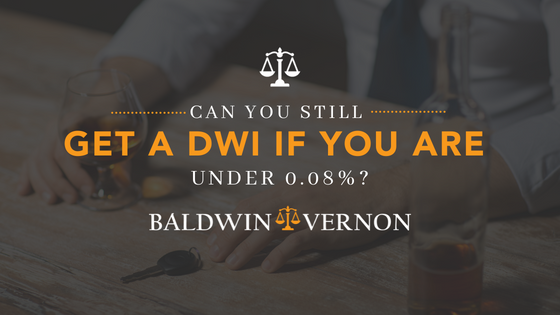All fifty states, including Missouri, follow strict driving while intoxicated (DWI) laws and regulations to ensure the safety and accountability of motorists. Federally, the blood alcohol concentration level stated to be illegal is 0.08%. For many, this may make it seem as if you have a lower BAC; no penalties are given.
However, with a BAC of 0.08%, that only allows law enforcement to arrest drivers immediately, with no need for additional evidence against the driver. However, a conviction can be given with or without a BAC level. Law enforcement must find evidence of impairment for a DWI to be given. Swerving, missing stop signs, running red lights, physical attributes, and other irregularities in driving laws can be seen as impairment.
There are also other reasons law enforcement may arrest a driver for a BAC lower than the legal limit. While driving and attempting to keep yourself and the others on the road safe, it is essential to understand your rights and responsibilities as a driver.
Is There Evidence of Impairment?
Whether you may or may not have a BAC over the legal limit, you can still be convicted for a DWI.
If you are swerving, disobeying street signs, physically impaired, or driving erratically overall, and law enforcement pulls you over with the question of driving under the influence, those actions are enough to count as necessary evidence even with a lower than 0.08% BAC.
Once pulled over, law enforcement can collect evidence by asking the driver to conduct a Standard Field Sobriety Test. This covers movements such as the horizontal gaze nystagmus, the walk-and-turn, and the one-leg stand tests. All of this will be captured and recorded on their dash or body cameras, as well as observed by the officer. The video and the officer’s testimony about her observations will be used as evidence in court. Sometimes the video alone can be sufficient to convict or acquit.
How the driver speaks, gets out their license and registration, their confusion level, current driving, and the odor of alcohol can all be considered evidence of a DWI. In the end, a BAC of 0.08% or higher is purely an evidentiary presumption.
Only having a 0.08% BAC as court evidence is considered a rebuttable presumption. The presumption of impairment raised by the .08 BAC can be rebutted or overcome with evidence that the BAC itself was the result of an invalid test, or by evidence that the driver did not exhibit any signs of impairment. The additional evidence by the body and dash cameras can help show physical evidence of impairment and reckless driving, or the lack thereof.
What if You Are Underage in Missouri?
With the legal age to drive being 16 but the legal age to drink being 21, laws are established for underage intoxicated drivers.
If a driver under the legal drinking age is pulled over while intoxicated, a blood alcohol concentration of only 0.02% is necessary for penalties. To help ensure the safety of the driver and the people around them, Missouri has Zero Tolerance laws put in place. These laws enforce an illegal drinking limit of 0.02% while trying to combat the real dangers that underage drinking and driving can bring.
A DWI can also be imposed on an underage driver if they are driving erratically or shows signs of intoxication beyond a BAC level.
DWIs and other traffic matters issued to minors will be dealt with in Municipal or Associate Circuit Courts in Missouri, rather than the Juvenile Court.
What is Implied Consent in Missouri?
Anyone who drives in Missouri automatically agrees to get their BAC tested under the Implied Consent Law, regardless of the circumstances. Breath, blood, sweat, and urine can be used in these scenarios.
In a circumstance where you refuse, your license will be revoked for one year, followed by a six-month usage of an Ignition Interlock Device to be able to drive your vehicle.
Punishments to Expect For Each DWI Charge
For the first offense to a DWI, the range of punishment is 1 day to six months in county jail and/or a fine of $500.. However, if the BAC is between 0.15% and 0.20%, jail time for up to 48 hours is required, and if the BAC is over 0.20%, jail time will increase to at least five days.
A second offense, also known as a Class A Misdemeanor, can result in up to one year in county jail and/or a fine of $1,000. For a second offense to be credible, it must have happened within five years of the first offense.
After a third offense, a Class D Felony, a year in the county jail, or four years in prison, and/or a fine of up to $5,000 is required. There is also mandatory 30-day imprisonment before the chance for probation or parole.
If the driver/defendant is generally cooperative, there are no injuries or accident involved, and it is a first or second DWI, it is not uncommon for a prosecutor to agree with a defense lawyer to recommend the court place the defendant on probation. On the second DWI the court must impose a short jail sentence. All DUI probations will include other costs such as: Fees for SATOP, probation fees, fees to pay a company to oversee community service, and if there is another ticket for moving violation the government likes to collect a significant fine as well.
A BAC of 0.08% or higher is known to be standard to obtain a DWI, but with the various other evidence applicable, your BAC matters only so much. To ensure that you are driving safely and obeying the law, it is crucial to understand your rights and the DWI laws in Missouri. If you have a DWI charge, are unsure of your rights as a driver, or have questions, contact the team of attorneys at Baldwin & Vernon.







